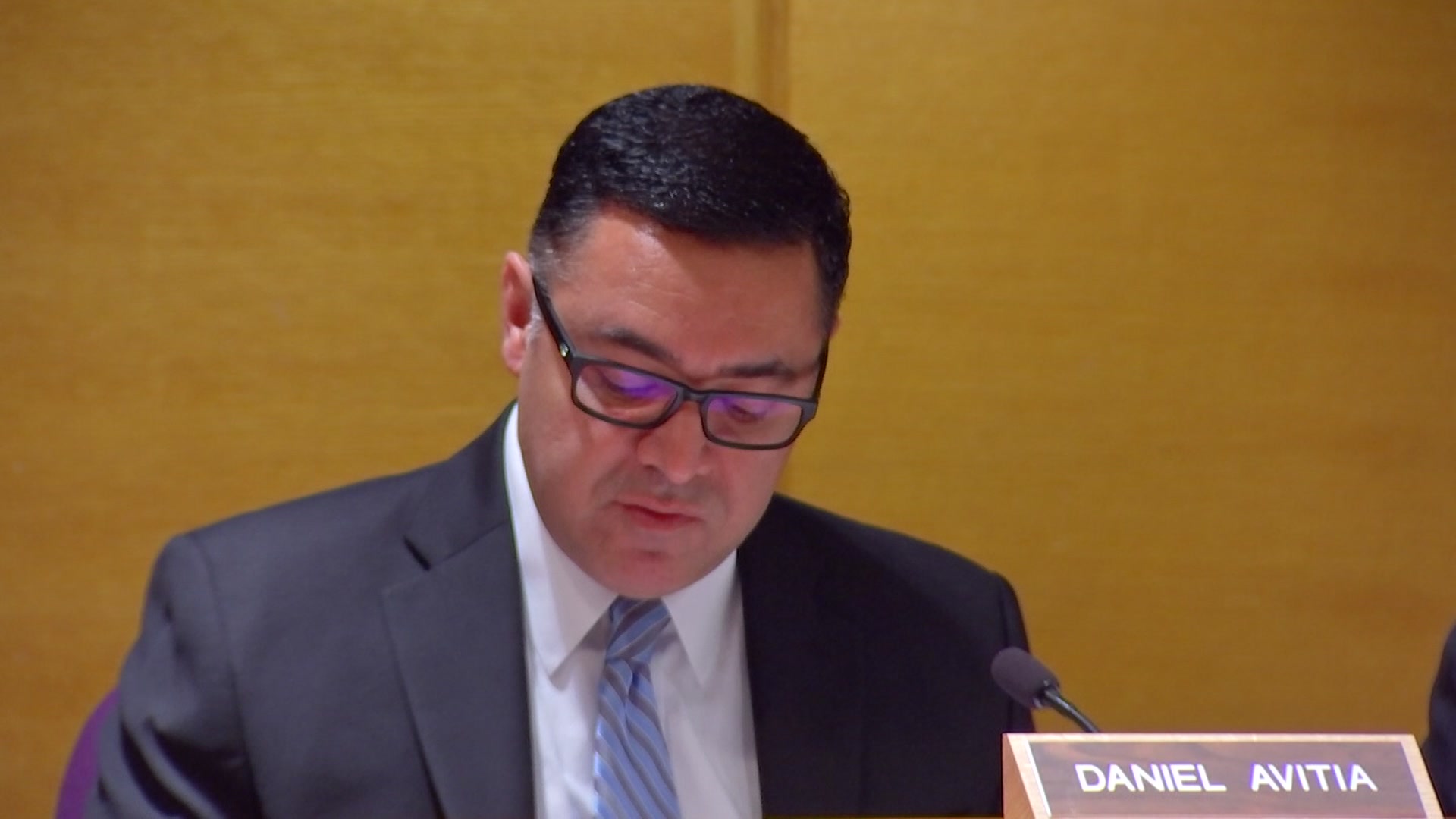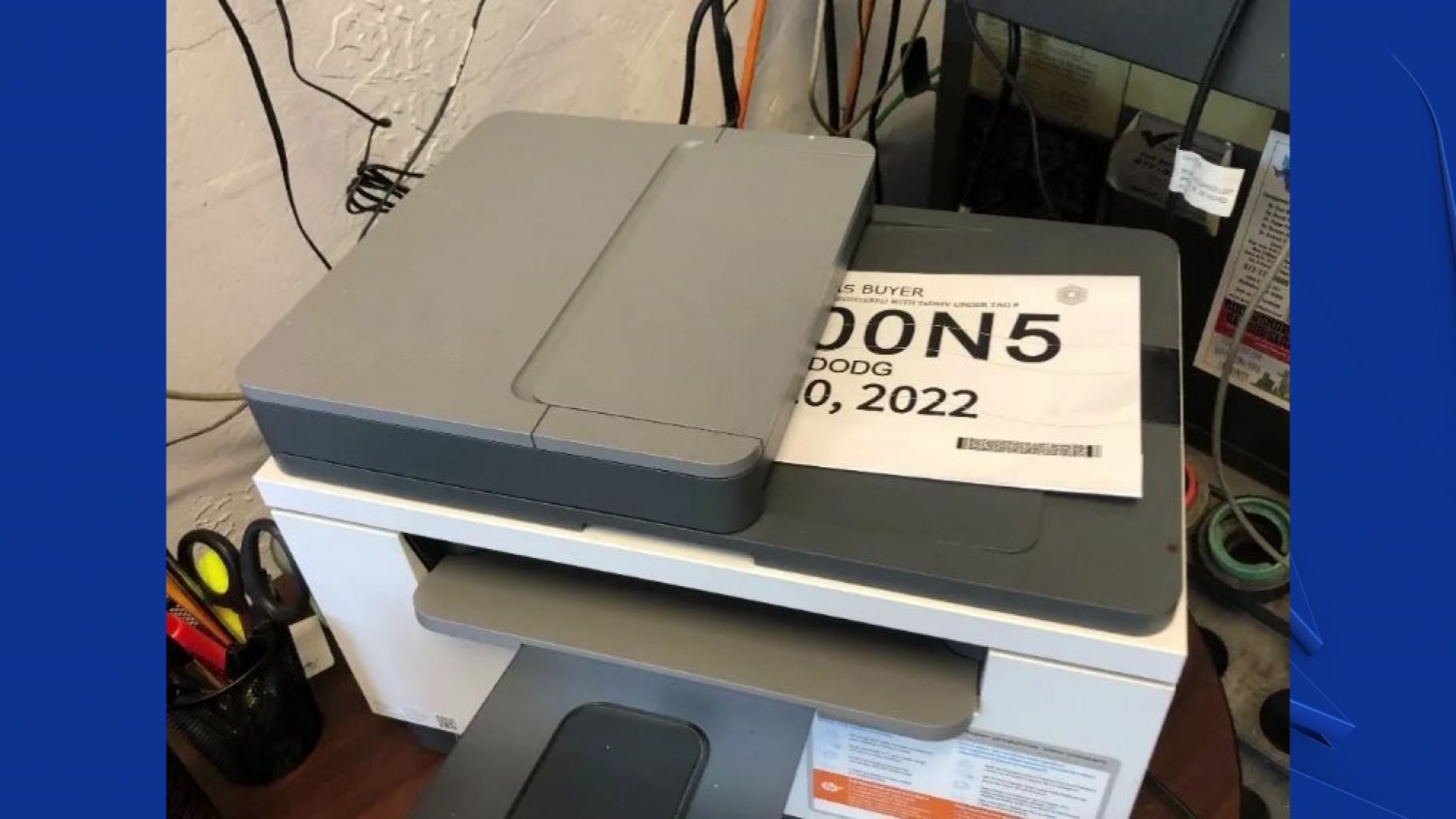A former top fraud investigator for the Texas Department of Motor Vehicles says agency administrators put up roadblocks that effectively prevented his team from quickly assisting police trying to stop the flood of Texas temporary license plates, sold by criminals who had gained access to the DMV’s temporary license plate system.
In an interview with NBC 5 Investigates, former TxDMV Director of Compliance and Investigations Tim Menke said he ultimately resigned from his post after being unable to persuade the department’s general counsel and executive director that his team should be allowed to share information more freely with police and federal agents investigating tag crimes.
Menke said a new general counsel who arrived at the agency in 2019 believed agency administrative rules limited the TxDMV's ability to share sensitive vehicle records with law enforcement. Menke described this as a philosophical shift in interpreting policy, that made it harder for DMV investigators to help with ongoing criminal investigations.
As NBC 5 Investigates has documented in an eight-month-long series of reports, the sale of fraudulent Texas temporary tags eventually grew into a $200+ million black market business, aided by a lack of thorough background checks at the TxDMV which allowed people to obtain car dealer licenses without an in-person interview or submitting fingerprints.
Get top local stories in DFW delivered to you every morning. Sign up for NBC DFW's News Headlines newsletter.
Some “dealerships” were opened by people using stolen identities, DMV officials have acknowledged. Those dealers were then able to access the state’s tag system, issue tags, and enter false vehicle and driver information.
As NBC 5’s reporting has documented, some fraudulent tags were then put on cars used to commit other crimes, making it more difficult for police to track the bad guys.

Recently, state lawmakers have been asking how the sale of illegal tags continued in large numbers for so long, and why the TxDMV was not more successful in stopping it.
“At some point, somebody's got to answer to this committee and the legislature as to why it would take so long, and why the media has to be the one that uncovers it,” said State Rep. Terry Canales (D-Edinburg), Chairman of the Texas House Transportation Committee at a committee hearing earlier this year.
The question Canales posed is perhaps more puzzling when you consider that in 2017 the state legislature gave the TxDMV funding to hire its own team of experienced fraud investigators, a team that Menke was eventually hired to lead.
Menke arrived at the TxDMV in early 2018 with decades of experience in federal law enforcement, as a top health care fraud investigator in the Department of Health & Human Services and as an agent in the U.S. state department where he was involved in diplomatic security and counterterrorism.
In his new post at the TxDMV Menke said he was alarmed to learn crooks were getting car dealer licenses and then selling fraudulent Texas tags in states as far away as New York.
“With my counterterrorism background and the identity theft associated with these temporary tags, my concern was that there could be a catastrophic event associated with the temp tags,” Menke said.
The “catastrophic event” Menke said he worried about most, was the possibility that terrorists might put a fraudulent tag on a vehicle used to deliver an explosive device.
“That would make us all look bad, and I don't know if you can put a dollar sign on the possible loss of life,” Menke told NBC 5 Investigates.

Menke said he directed his staff to coordinate with state and federal agencies already conducting tag fraud investigations.
His team had one shortcoming: they were not commissioned officers with guns and badges, but they would be able to assist police and federal agencies by providing quick access to vehicle and dealer records needed to track the fraudsters and unravel their criminal networks.
But Menke said his efforts to work more swiftly with police were eventually met with pushback inside the TxDMV.
“In the spring of 2019, things changed. Almost an adversarial role with law enforcement started being ingrained in the culture,” Menke said.
That culture shift, Menke said, came with the arrival of a new top DMV lawyer, Tracey Beaver, the agency’s general counsel.
Menke said that Beaver viewed the TxDMV as an administrative agency that should not be involved in law enforcement.
“I think she had a very conservative and narrow philosophy as to what could be given to law enforcement and under what circumstances,” Menke said.

Menke argued state and federal law generally allow agencies to share confidential vehicle and driver records with police in criminal investigations. But he said Beaver took the position that the TxDMV’s own administrative rules put stricter privacy limits on sharing.
“The philosophy had changed. I wasn't comfortable with it because I think it was making it harder for law enforcement to get the information they needed in criminal investigations, which is directly contrary to why I was hired,” Menke said.
NBC 5 Investigates spoke with two former TxDMV staffers who confirmed details of Menke's account.
Ultimately, Menke said Beaver required his team to jump through hoops that made it nearly impossible to quickly assist the police.
Every time an officer asked Menke’s team for a new piece of information, Menke said, Beaver expected his team to follow a TxDMV rule that said officers must fill out a form and provide their credentials. Menke said Beaver insisted on that even if the officer was already working with the TxDMV in an ongoing investigation
“Think of someone you work with four or five days per week as a business relationship, and every time you change the topic, you have to stop and say, ‘I'm sorry, I need your picture before I give you any more information.’ How long do you think that relationship is going to last?” Menke asked.
PAPER TAG NATION
Tracey Beaver declined to be interviewed for this report but instead released the following statement to NBC 5 Investigates:
”As general counsel for the TxDMV, any legal advice rendered for the agency as my client is confidential attorney-client privileged communication. The TxDMV is not a law enforcement agency. The TxDMV was always supportive of law enforcement efforts. I was happy to support TxDMV in their partnership with law enforcement.”
Menke said Beaver was not supportive and eventually ordered an audit of his division which found that his investigators were violating TxDMV rules when sharing information with police. It left Menke feeling the agency was more interested in questioning his team that the crooked car dealers who were selling tags.
“If the non-franchised, used car dealers would have been under the same scrutiny that the department put law enforcement under, I'm not sure we would be here today,” Menke said.
NBC 5 Investigates requested a copy of the audit of Menke's division. The TxDMV has asked the Texas Attorney General for permission to withhold the release of the records saying they contain confidential information. But in a letter to the AG’s office, the TxDMV confirmed that the audit of Menke’s division was in fact requested by the general counsel’s office.

Eventually, Menke said he went to then TxDMV Executive Director Whitney Brewster to complain about the general counsel and ask for changes in the policies that he believed were preventing faster cooperation with law enforcement.
Email records that NBC 5 Investigates obtained through an open records request confirm Menke expressed concerns in a meeting with Brewster in July 2019.
When asked how Brewster responded to his concerns, Menke told NBC 5 Investigates, “She said well the board likes the general counsel, so she’s not going anywhere.”
As the months passed, frustration grew among police investigating tag fraud causes.
In Travis County, constables investigating tag fraud eventually served a search warrant on the Texas DMV in March 2020 to obtain information they were seeking in a major tag fraud case.
Menke said it didn’t have to be that way.
“That took place, and as a retired federal agent in that position, that is supposed to cooperate and communicate with law enforcement, it was embarrassing,” Menke said.
Menke ultimately felt his team was out of options. If they kept sharing with law enforcement, they could be found in violation of DMV rules again. But if they stopped working swiftly to assist officers, the criminals might get away.
“I was in a no-win situation, and that's why I took an off-ramp. And I just decided to move on to other employment at that time,” Menke said.
He resigned in February 2021.
In August of that year, the division Menke was hired to create was disbanded and merged into another DMV division.
Three months later, in November 2021, an NBC 5 investigation exposed how rogue dealers were continuing to sell hundreds of thousands of tags, raking in millions in illicit profits.
In February 2022, Brewster resigned as executive director as the agency's board demanded swifter action to address the tag troubles.

Two days later Beaver also resigned. Her resignation letter gave no explanation for her decision except to say, "like all good things, my tenure at the agency must come to an end."
Menke hopes new DMV leadership will be more aggressive about sharing information with police.
“I just think the obstacles that were put in front of law enforcement's way were unnecessary,” Menke said.
NBC 5 Investigates made numerous attempts to reach former executive director Brewster for this report, but messages were not returned.
Before she resigned, Brewster told NBC 5 in interviews that the agency was working aggressively to stop the illegal sale of tags. But Brewster said the DMV was unable to immediately suspend crooked car dealers from the state’s electronic tag system until the legislature passed a new law in 2021 which gave the TxDMV more authority to swiftly revoke access in cases where fraud was suspected.
PREVIOUS REPORTS
- June 12, 2023 - Gov. Abbott signs law eliminating paper license plates in Texas
- May 24, 2023 - Bill to Eliminate Paper License Plates in Texas Passes Texas Senate
- March 27, 2023 - Texas DMV's New Paper Tag Design Easily Counterfeited, Police Say
- Nov. 17, 2022 - Texas DMV Redesigns Paper License Tags to Include New Security Features
- Nov. 15, 2022 - Police Searching for Paper Tagged 'Ghost Car' in Deadly Grand Prairie Chase
- June 1, 2022 - Police Make Bogus Tag Bust Tied to Social Media Ads
- May 18, 2022 - TxDMV Names New Executive Director Amid Paper Tag Crisis
- May 17, 2022 - Vehicle Used in Dallas Salon Shooting Had Paper Tag
- May 12, 2022 - Ads for Fake Tags Persist, Despite Facebook, TxDMV Efforts
- May 4, 2022 - Texas' Paper Tag Problem Compounded by Small Dealers Misusing Them
- May 3, 2022 - Dallas Police Shut Down Accused Fake Paper Tag Dealer
- April 26, 2022 - Texas House Set to Hold Paper Tag Hearings
- April 14, 2022 - Texas DMV Cracks Down on Dealers Selling Temporary Paper Tags
- April 13, 2022 - TxDMV Closes Inspection Loophole That Put Unsafe Cars on Roads
- April 12, 2022 - Dallas Police Go Undercover to Fight Illegal Paper Tags
- April 7, 2022 - Police Warn of Fake Paper Tags Used to Cheat Car Buyers
- April 5, 2022 - Texas Senate Will Investigate Illegal Paper Tag Crimes, Smuggling
- March 9, 2022 - Texas Paper Tag Crime Danger Extends Nationwide
- March 5, 2022 - Texas House Will Hold Hearings on Paper Tag Mess
- Feb. 28, 2022 - License to Smuggle: Drug Cartels and Human Smugglers Use Paper Texas Tags to Evade
- Feb. 15, 2022 - Fort Worth Police Announce Special Operation Targeting Paper Tags
- Feb. 14, 2022 -- Crash Victim's Parents Want More Cops to Police Paper Tag Fraud
- Feb. 13, 2022 - More Funding Need to Fight Criminals Using Bogus Paper Tags: Police
- Feb. 10, 2022 - Police Report Drop in Fraudulent Tags But Warn Crooks Are Adapting
- Feb. 9, 2022 - Texas DMV Shuts Down Six More Dealers Suspected of Selling Paper License Tags
- Feb. 7, 2022 - TxDMV Director Resigns Amidst Paper Tag Mess
- Jan. 27, 2022 - TxDMV Takes Emergency Action to Keep Crooks From Selling Paper Tags
- Jan. 21, 2022 - Dallas Police Operation Targets Fraudulent Paper Tags
- Jan. 17, 2022 - Recording Shows Police Warned TxDMV of Paper Tag Security Flaw Years Ago
- Dec. 16, 2021 - DMV Committee Recommends Fingerprinting Some Dealers to Slow Paper Tag Fraud
- Dec. 14, 2021 - Texas House Transportation Chair Vows to Stop Paper Tag Fraud
- Dec. 6, 2021 - Texas DMV Boss Deflects Blame for Paper Tag Debacle
- Nov. 23, 2021 - Illegal Paper Tags Costing Texas Taxpayers and Toll Roads Millions
- Nov. 10, 2021 - Suspected Paper Tag Peddler Shut Down Tuesday, Reopens Wednesday: Investigators
- Nov. 8, 2021 - How Texas Paper Tags Became a $200M Criminal Enterprise: NBC 5 Investigates




